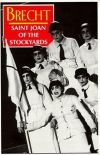
A Vida de Galileu é uma peça de teatro de autoria de Bertolt Brecht, escrita entre 1937 e 1938, e depois em 1943.

Mãe Coragem e Seus Filhos é uma peça de teatro escrita em 1939 pelo poeta e dramatista alemão Bertolt Brecht com contribuição significativa de sua amante na época, Margarete Steffin. Ela também foi filmada.

The Good Person of Szechwan is a play written by the German theatre practitioner Bertolt Brecht, in collaboration with Margarete Steffin and Ruth Berlau. The play was begun in 1938 but not completed until 1943, while the author was in exile in the United States. It was first performed in 1943 at the Zürich …

Die Dreigroschenoper é uma revolucionária peça de teatro musical do dramaturgo alemão Bertolt Brecht com música do compositor Kurt Weill. Estreou em 31 de agosto de 1928 no Theater am Schiffbauerdamm, em Berlim. A peça é uma adaptação da ópera musical The Beggar's Opera, de John Gay, e inspirou Ópera do Malandro, …

O Círculo de Giz Caucasiano é uma peça de teatro escrita em 1944 nos E.U.A. pelo escritor alemão Bertolt Brecht. Tradução para o portugues de Manuel Bandeira, edição da Editora Cosac Naify. Está situada na época da Revolução Russa. Sinopse: O Círculo de Giz Caucasiano fala de questões como a Justiça, a guerra e o amor …

Translated by Desmond I Vesey. Verses Translated by Christopher Isherwood. Ex-library Sticker on the Front..Softback,Ex-Library,with usual stamps markings, ,in fair to good all-round condition, ,365pages.

Bertolt Brecht Translated by George Tabori Drama Characters: 30 male, 5 female Brecht's shudderingly accurate parallel between Hitler and his henchmen on the one hand and the old crime lords of Chicago on the other is a vigorous eye opener that was produced on Broadway with Christopher Plummer. The Cauliflower …

Bertolt Brecht's Stories of Mr. Keuner is a collection of fables, aphorisms, and comments on politics, everyday life, and exile. From 1930 til his death in 1956, Brecht penned these ironic portraits of his times as he was "changing countries more often than shoes." An ardent antifascist, Brecht roamed across Europe …

 English
English Español
Español Deutsch
Deutsch

